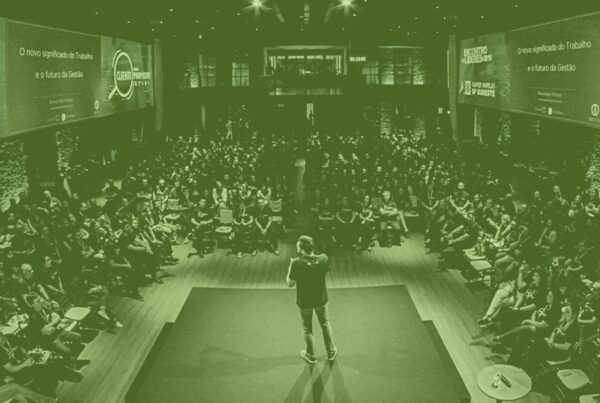Put your captain’s hat on, it’s time to talk leadership in the events industry! Here at Endless, we’ve been sharing with you a bunch of good stuff. All of it, we were lucky enough to collect during our time at IMEX America. But because you can never get too much of a good thing, the knowledge will keep on coming! Over the next few weeks, we’ll be posting all the nuggets of wisdom gathered throughout the course of this major event. Brace yourself, because it’s going to be a handful.
We partnered with MPI to bring you many different topics and iconic guests partaking in interesting conversations. Not only that but each of these topics are packed full of tips and actionable steps to take to get you right where you want to be! To kick things off, today we’ll be talking about women in leadership in the events industry. Featuring special guests Sarah Soliman, Stacyann Doria, and Donna Brighton, we offer you the best insights and inspiration to take your leadership skills up several notches. Are you ready to go? Check out all the amazing interviews below!
How Young Leaders Can Make An Impact In The Industry

You might recognize our first special guest from the Women in Events episode of #EventIcons! Sarah Soliman, CEO of Soliman Productions, has been in the industry for a decade and is an inspiration to so many in the events industry, especially women! And from the very beginning, it was a major goal for her to become a thought leader. “I wanted have a voice, and show other young people that you too can have a voice in this space. You just have to kind of go for it”, she says. One of the biggest steps to Sarah was to be able to create her own business. And it was through this that she found “my own confidence, my own voice, found my path, and also found a home in this space”. It wasn’t easy but through hard work, she is achieving those goals, below are some of the steps she has taken and tips she has to share.
Volunteering
“First off, always figure out what your strengths are, and utilize them”, says Sarah. “I think the best way to do that is through volunteering. Because what’s happened through my volunteer work is that I was able to take that back and implement it into my day-to-day work life. And it’s made me a better leader in my business, with my clients. It’s given me a sense of confidence, my network as grown, I’ve learned my leadership style – what works and what doesn’t”.
Finding The Time
Being able to learn about yourself, and to truly find your confidence, are the pillars for building strong leadership skills. Volunteering offers the space to make mistakes and to steadily acquire more knowledge. “You have to really want it, it takes a lot of commitment”, adds Sarah. “Know what your time limitations are. And if this is something that is really important to you, then you’re going to find the time to make it happen. I’ve had to sacrifice a lot of other things in order to say yes to become a leader in the industry”.
Here, the need arises to create what Sarah calls “white spaces” in your calendar. These are the time slots where you choose how to decompress, relax, recharge. And they are a great opportunity to take it all the way back to industry and volunteer, while simultaneously working on your leadership skills.
The Impostor Syndrome
Everyone feels a little bit of the Impostor Syndrome, no matter what industry they work in. And this is particularly true for those who are just starting out. What are Sarah’s thoughts on overcoming it? “It takes a lot of self-reflection, and kind of throwing yourself into the fire”, she says. “You just have to find your sweet spot and that confidence. And know that you might be young, but people still want to hear what you have to say. Because your perspective is always going to be unique to somebody in the room, regardless of age, gender, religion. You start combating that impostor syndrome when you start to understand that you have something valuable to say. And it’s going to stick and resonate with someone in that room”.
Voicing Opinions
“I think one of the most disappointing things in a lot of the membership organizations is that members don’t do the basics. So, you are investing by being a member. The least you can do is voice your opinion”, says Sarah. “The value of associations is incredibly important. And if you’re going to invest time, money, and energy, be an active member and voice your opinion. Regardless of age”.
Younger people do tend to be more vocal. But then again, there are also those who are afraid to “rock the boat” or “step on someone’s toes”. But again, “if you have something to say and share, do it. Because you’re only going to make the experience that much better for the generation that comes after”.
Words Of Wisdom For Leadership In The Events Industry
Sarah leaves us with a couple of words to live by: “If you’re a young person, or a woman, in the industry, don’t second guess yourself. If you ever do, have a support system around you that’s going to push you to get over the impostor syndrome, get over your insecurities, really encourages you to go for it. Find that organization that really resonates and sticks with you. Take those programs and start to hone in on your skillset. You’ve got this”.
Understanding The Multi-Generational Gap

Next up we have the inspiring Stacyann Doria of The Event Narrative! And we are talking about the hot topic of Millenials! In the world we live in, it’s hard to escape stereotypes. And in the case of generational stereotypes in the event industry, this is also true. As Stacyann Doria puts it, “Millenials are always cast as being lazy and entitled. And so we talk about that and we talk about how in the workplace, what are we doing to empower Millenials to get to the next plan? To say that everyone in this generation is lazy is absolutely horrible. And if that’s how you feel, what are you doing to help me in the workplace?”.
The Other Side
Exactly how can older generations help out Millenials, then? For Stacyann, it’s all about succession planning. “You want the people who are working for you and reporting to you, to be the people who are going to take your role. Because ideally, you’re trying to move up as well. So you should be hiring people that are smarter than you”. Additionally, it’s key to remember how you got where you are in the first place. Someone helped you as well, mentored you, and groomed you. So, it’s only fair to assume you should be passing the torch to someone else as well. “I always consider myself a student, but I also consider myself a teacher”, Stacyann adds.
What About Millenials?
There are two sides to every story. And when it comes to bridging the generational gap inside the workplace, this applies. As a Millenial, “you also have to be willing to grow, and willing to take that advice. You can’t be so stuck that if someone says you made a mistake, you’re like – oh, let me tell you something you did wrong! So, you have to also trust that someone is coming from a place of good when they’re helping you.
Plus, remember the power or learning. “At the same time, events like these, and doing these sessions, and just networking with your peers, you’re going to learn something new constantly. This industry is evolving daily. So if you think you already know it all, you’re starting at the wrong place”.
Bridging The Gap
“In the corporate world, you have to also be willing to look at that junior person. A lot of times, you hear people saying they need someone with ten plus years, fifteen plus years. No one started with that much experience. And so that mentorship is really important”, says Stacyann. It goes beyond just your inner professional circle as well. “As an event planner, I don’t just network and look for mentors with other planners. I’m looking at my suppliers, I’m looking at my hoteliers, my other vendors. Because I’m hoping that my knowledge is a well-rounded knowledge. So if you do that, you’ll gradually start working together as a group, as a team”.
Younger generations are also often the target of what one would call typical Millenial jobs. The social media person, the paper pusher, and roles that overall don’t really come attached to a sense of power or importance. Stacyann believes that people need to have more faith. “You trust that the people you have working with you know what they are doing. And you trust that if they have a question, they will come to you.
Building Trust
“You have to know that failure is okay”, she adds. “No one’s one hundred percent perfect on everything. And trusting someone else begins with trusting yourself. I also think that coming to sessions and trade-shows like this kind of help you build your trust. It makes you step out of yourself and realize that you don’t know it all. Suddenly you find yourself in the student position, always willing to learn something new. And then you start trusting people”.
Staceyann also leaves us with some words of wisdom: “Stop the grouping. Stop saying that everyone is one way because that’s not true. The struggle is universally real. Just always make sure that the people you’re working with, are the people you want in your role. You’re hoping to grow, they’re hoping to grow, so make sure you’re building a team of people smarter than yourself. And make sure you always know that you are a constant student, but always have something to teach as well”.
Taking Leadership To The Next Level

Hearing the word leadership probably brings a bunch of different things to the minds of different people. Donna Brighton of Brighton Leadership Group has a great concept around coming to terms with what leadership in the events industry actually is. “There’s a ton of books, millions of them. And there’s not a single agreed-upon definition of what leadership is. And the reason I believe that’s true is that each one of you is unique And what leadership is to you is different from what it is to me”.
Defining Your Leadership
What this means is that you have to find your own version of this complex term. Donna feels like the first thing you need to do when considering moving into a leadership position is asking yourself why. Is it because you want to make a difference for your team? Is it because you want to move up the career ladder? Or is it because you want to change the world? “Why do you want to be a leader? Start there”, Donna says.
The next thing is stopping and thinking about what leadership in the events industry means to you. “When you’re clear on your definition of leadership, then you have a guide that helps you along your path”, she adds. “To me, personally, it’s about an influence relationship. In today’s world, we need people who influence for good. And my desire is to help my team realize the best of who they are, that’s my passion”.
Task-Oriented & Introverted Leaders
Things get a little trickier for those who want to pursue leadership roles but don’t exactly fit into the extroverted category. “If you’re introverted, one of the first things you can do is lead yourself”, advises Donna. “Are you living according to the ideals that you have? Are you achieving the goals that you want to? Because why should anyone be led by you if you can’t lead yourself?”.
The Wheels Keep On Turning…
If there’s one thing we can all agree on when it comes to the event industry, it’s that you close your eyes, and something changes. Being a leader in this sort of environment can become quite overwhelming. So what can be done about this? “I’d like to begin with some clarity in the difference between change and transition”, says Donna. “Change is the external thing that happens to you. The reality is that the change that happens externally is going to happen. The question is the internal peace, and that’s a transition”.
“Any change that happens, while you go through it, it requires some learning. So the first thing you want to do is ask, what is the change, exactly? And the second thing is to ask what does success look like?”, she adds. “Change creates uncertainty, and you begin to feel fearful. So take ownership of what’s happening. And instead of putting a label on yourself, stop and think about what makes you amazing, what your strengths are. And how you can bring them forward in this transition”.
Handling Change
Everything starts with your mentality, especially when it comes to changes. We’ve already been over some of the first steps of the mental process. But Donna still has more tactical tips to offer when it comes down to handling change. “There are some people who have so much going on in their lives, and they’re off the stress charts. You need to understand there are times when you have more change than you have the capacity for. And give yourself permission to recognize that”, she says.
Once you are confronted with a situation like this, there are several roads you can choose to take. “You can squeeze it out and decide to do less change if you’re feeling overwhelmed. And the other thing you can do is some resilience practices”, explains Donna. “It’s about adding practices that will make you more resilient. Have a gratitude practice, exercise, meditate”.
Speak Up!
Donna has learned that, in general, leaders tend to love change. Sometimes going as far as implementing it in a rhythm that saturates the other people inside the company. For those, speaking up to say “we can’t absorb and do things with excellence if we don’t pay attention to this”, she says. “What leaders don’t appreciate is that not everybody shares that level of excitement because you’ve been thinking about the change before they have.
“Change is more than just communicating and telling people about the change, or training them on it. There’s a lot more that goes into that. So, educate yourselves, learn more about change management, and that will help you to be more effective on the changes you need to make”, Donna concludes.
That’s A Wrap On Leadership In The Events Industry!
And that does it for the first one of many blogs in this series to come! Hopefully, this crash-course on leadership in the events industry has already propelled you forward a little bit. But if you really want to take a step forward we recommend checking out MPI’s Women in Leadership Executive Skills Certificate Program. This program will put you on the fast track for success empowering you with the skills and practices needed to find the right leadership roles for you! Do you have advice for women leaders within our industry? What do you feel we need to see more of from leadership in the events industry? Comment below and let us know!
Resources:
Women in Leadership Executive Skills Certificate Program
Resilience (HBR Emotional Intelligence Series)









